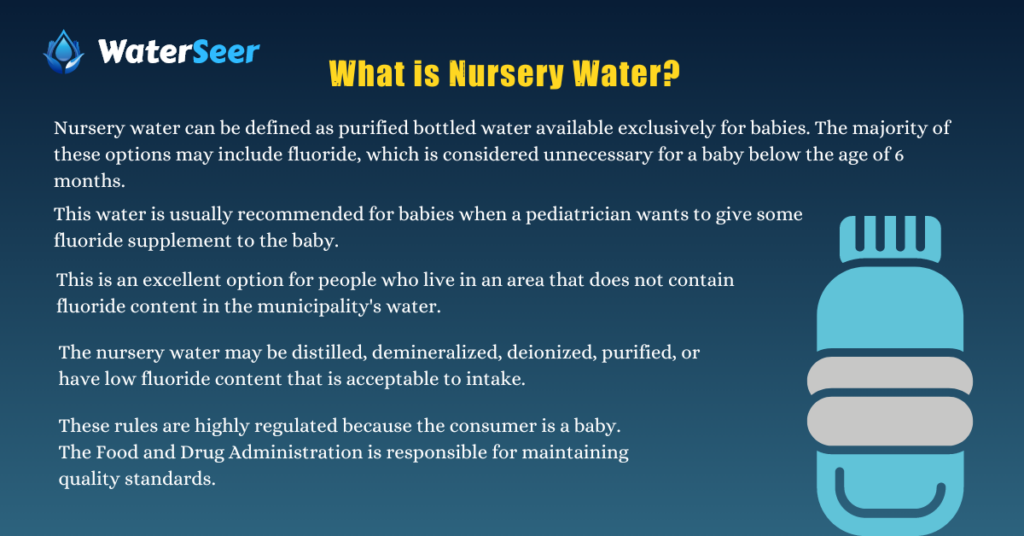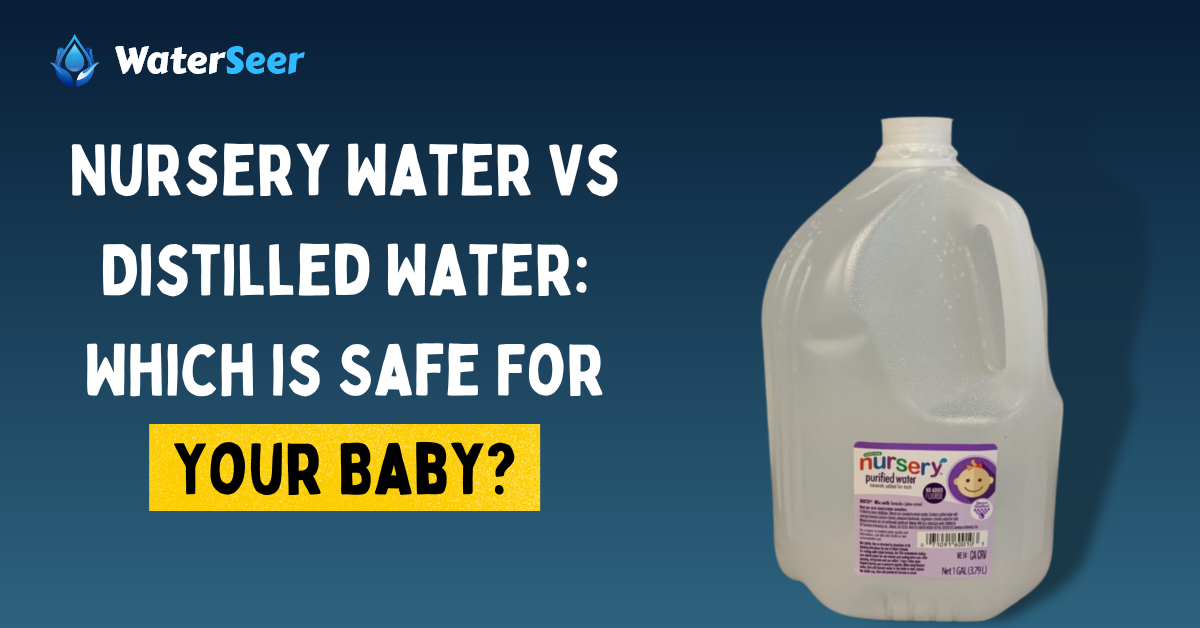We all know it is hard to think about anything else when you have a baby at home. Especially when it comes to what they eat and drink.
The American Academy of Pediatrics says that tap water, free from contaminants, is the best water for babies and formula. They have suggested to boil the water and then cooling it down for at least 5 mins before mixing it with a baby formula to give it to your baby.
Tap water is mostly not free of contaminants, which is unhealthy for babies. This is why you can consider using nursery or distilled water. Both come with their own pros and cons, so let us get right into it!
What is Nursery Water?

Nursery water can be defined as purified bottled water available exclusively for babies. The majority of these options may include fluoride, which is considered unnecessary for a baby below the age of 6 months.
This water is usually recommended for babies when a pediatrician wants to give some fluoride supplement to the baby.
This is an excellent option for people who live in an area that does not contain fluoride content in the municipality’s water.
The nursery water may be distilled, demineralized, deionized, purified, or have low fluoride content that is acceptable to intake.
These rules are highly regulated because the consumer is a baby. The Food and Drug Administration is responsible for maintaining quality standards.
There are different nursery water available in the market; a few of them are listed down below:
- Nursery distilled water is steam distilled water generally used to remove the impurities from the water.
- The fluorinated nursery water is steam distilled water with a shallow fluoride content (i.e., 0.7ppm). The American Dental Association always supports the amount of fluoride to protect the dental health of an individual.
The Safety
Regarding safety, this product is entirely safe to be used for baby formula and babies. To enhance the sterilization process, you can opt to boil the water. And can easily avoid this process if your area already has high-quality water.
The Disadvantage and Alternative Options
The only disadvantage of the water is the price, as it is expensive and sometimes may be considered worthless.
The alternative option to choose for a baby instead of the nursery water is tap water that has been filtered by a water filtration system at your home.
Sometimes, because of poor maintenance, the water filtration system cannot remove enough amount of fluoride and other contaminants. So ensure that you have already undergone periodic maintenance of the equipment.
Another option is to heat the water at around 70 degrees Celsius or 158 degrees Fahrenheit while preparing the formula for your baby.
Even the manufacturer recommends boiling the water before making baby formula because boiling automatically removes the disease-causing microorganisms, which puts you on the safer side and proves you are an aware consumer.
The Importance of Directions
As per the directions in every packet brand, you shouldn’t add much water to the formula because it will increase the hydration factor leading to water intoxication.
Always stick to the guidelines mentioned in the box, and always consult with your doctor before giving anything to your baby.
According to the World Health Organisation, people must boil the water to kill the disease-causing bacteria from the water. The water safety guidelines vary from one region to another depending on your location, which is why it becomes much more important to talk to a pediatrician.
The local health department can also be contacted if you want to learn more about your area’s water quality. This will help you decide whether you should boil the water or shall use it directly.
What is Distilled Water?

Distilled water is a form of water purified by boiling it into steam and getting it converted into a liquid state again. It is a straightforward process, but one has to maintain a sterilized environment while performing this process.
Distilled water is considered suitable for drinking. It is medically fixed water, as it does not have any dissolved gases or minerals.
The minerals dissolved in the water are responsible for maintaining the taste of the water, due to which the distilled water does not have any taste or has a very bland taste.
It is a widespread process in research laboratories and other industries. This water has no minerals like calcium, potassium, or magnesium.
People having a deficiency in these minerals should avoid drinking distilled water. Even if a person takes a very high amount of distilled water, they must maintain their diet correctly to fulfill their body’s requirements.
There are three main methods due to which a distillation process is done. These methods are listed down below:
- The most uncomplicated distillation process is to boil the water at 100 degrees Celsius. After this, the steams are collected into another chamber or the collecting container, which cools down and forms pure water.
- The multistage flash distillation process is a complex process that requires very high pressure. High pressure lowers the water’s BP (boiling point ), producing steam without heating it. The smoke is collected into a collecting container or another chamber.
- Fractional distillation is a multistep process that requires heating, evaporation, and condensation.
The Use of Distilled Water
The most common use of distilled water is in cosmetics, the food industry, home appliances, engines, the medical sector, the research sector, and aquariums.
The distilled water is entirely safe to consume, but you need to know that it doesn’t contain any minerals. So, you need to consult with your doctor to get a better perspective on this.
The doctor can ask you to proceed with distilled water if your baby is healthy and has no mineral-realted deficiencies.
The whole process should be taken out after strictly following the recommendations of a pediatrician.
To make a baby formula, the parents can boil the tap water at around 70 degrees Celsius and collect the steam, which will convert into liquid after a few seconds.
The laws regarding distilled water vary from one area to another, depending on the quality of the water in your locality.
For example, according to Health Canada, distilled water is only recommended for a baby who has crossed the age of 4 months. Even the distillation process is only restricted by boiling the water for just 2 minutes and letting it cool down in the liquid form.
As informed consumers, the parents should also read about the components mentioned in the packaging of the distilled water and the baby formula.
Bonus Read: How To Make Your Own Distilled Water? In 5 Easy Ways
What is the Difference Between Distilled Water and Nursery Water?
In the above section, we have discussed nursery and distilled water. In this section, we will look at the main differences between the water forms, which will help you decide which option to choose to make the baby formula.
As a responsible parent and informed consumer, an individual needs to research a specific topic before you feed the baby; talking to your doctor or any other pediatrician about the water type is also essential.
The Main Difference: Minerals
The main difference between other distilled water and nursery water is that the distilled water doesn’t have any minerals, while the nursery water has added minerals.
As mentioned earlier, nursery water has a mixture of calcium, potassium, and magnesium, which enhances the taste of water, while it is not the same as distilled water.
The filtered water has a balanced flavor, a disadvantage for this water form.
The Fluoride Content and Baby Formula
The fluoride content is also a concern in the baby water market to maintain the health of babies, and most brands use it as an optional component.
The baby formula already comprises trace amounts of fluoride content to maintain dental health, due to which several countries have stopped adding fluoride into tap water.
According to the Department of Health and Human Services, around 0.7 mg/L of fluoride is recommended in drinking water to maintain dental health, while it will be less with babies.
Excess fluoride intake can influence a child’s health, leading to skeletal fluorosis bones, discoloration of teeth, and so forth. Thus, it is recommended to consult a doctor and the municipality department of your area to learn about the purification process.
Frequently Asked Questions
What is a baby formula? Why is water required to make up baby formula?
The baby formula is also known as the infant formula. According to the American Federal Food Drug and Cosmetic act, this formula enhances the baby’s health by providing sufficient nutrients.
The baby formula is generally recommended for infants or kids younger than 12 months and prepared for cup feeding or bottle feeding. Water is mandatory for making baby formula because it is manufactured or sold in the market in powder form.
Hence, you need something to mix the powder and give it a liquid texture so that it will be easy for the baby to digest and eat.
Why is water quality essential to make the baby formula?
As adults, we know that most of our body weight is due to water. Water is also the main component of our cells, and they will die without water.
We have always heard about how minerals in the water and the presence of disease-causing microorganisms in the water can influence our health, and the same thing happens with babies as well.
In the end, we all have achievements, we all have similar cells, and we all need water that is best in quality and provides enough nutrients for cells to survive. Thus maintaining the proper functioning of the body.
Why is it essential to consult the doctor?
In the article, we highly focused on doctors’ importance and the importance of consulting with them before feeding anything new to the baby.
Every baby has different needs and requirements depending on its approach and conditions. The doctor will recommend the diet according to your baby’s needs, Which is why the doctor plays a vital role.
It is also necessary to check with your municipality department because they will let you know what filtration process they used to facilitate the water supply.
Also, if you’re consulting your local pediatrician, they would know the water quality and suggest the most suitable one for your child.
Conclusion
The new parents have numerous questions related to their baby’s health and baby formula. This question can be very complex or the most basic question, like water quality.
Every pediatrician recommends specific baby formula to maintain the newborn’s health or give all the nutrition required for the growing body.
Many parents simply skip the instruction part and move forward with making a formula by mixing it with water. They don’t know that the water quality influences the baby’s health. So that is why distilled water and nursery water come into play.
You have certainly come to your conclusion and have raised several questions in your mind. We have discussed them in detail in this article, and we hope this article will have helped you to gain new knowledge.
Still, to get much more clarity, we will always recommend you to visit and consult your doctor because they know much better about the water quality and your baby’s requirements.
Clear your confusion with your doctor before giving anything new to your baby. We wish you all the best and know that you will become a great parent.

